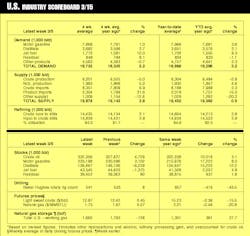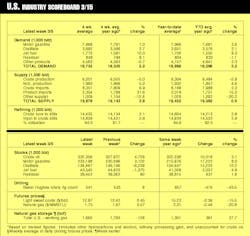Oil prices have soared to their highest level since November. Markets have become galvanized with fresh optimism that more production cuts will come as the OPEC meeting Mar. 23 in Vienna approaches (see related story, p. 28).
The catalyst for a startling 84¢ spike to $14.69/bbl for Nymex April crudeat closing Mar. 10 was the market's buzz over a meeting, at presstime slated for Mar. 11, in Amsterdam of linchpin exporters Saudi Arabia, Iran, Venezuela, Algeria, Mexico, and Norway. Saudi oil minister A* Naimi said, prior to the Amsterdam meeting, that OPEC and key non-OPEC exporters will agree to production cuts ahead of the Vienna meeting. The cuts would probably need to be at least 1-1.5 million b/d, in order to siphon off the massive inventory surplus overhanging the market enough to balance supply and demand again. Naimi reportedly was to brief the oil ministers of those other five nations of an agreement Mar. 10 by his country, Kuwait, Qatar, and Oman to cut production.
The apparent decision to trim output by the four Persian Gulf producers came, ironically, against the backdrop of Saudi Arabia's formal inauguration of supergiant Shaybah oil field that same day. The Saudis, already the holder of at least 25% of the world's proved oil reserves, have booked another 14 billion bbl of oil and 25 tcf of gas with Shaybah, a massive reservoir with 42° gravity oil and <0.7% sulfur. Completed a year ahead of schedule, the remote Empty Quarter field will produce about 500,000 b/d of oil.
In another example of the "rich getting richer"-at least in terms of an OPEC member's oil reserves and productive capacity-Nigeria may have yet another deepwater giant.
Statoil and Texaco have made an apparent major discovery on Block 218 in deep water off the central Niger Delta. Preliminary data indicate the find could contain several hundred million barrels of recoverable oil, say the firms. The discovery well, NNWA-1, was drilled in 4,206 ft of water and cut more than 310 net ft of pay in multiple oil zones at 8,700-14,645 ft. It is Texaco's second big deepwater find off Nigeria this year (OGJ, Jan. 11, 1999, Newsl
etter). Interests in the block, held under a production-sharing contract with Nigerian National Petroleum Corp., are operator Statoil 53.85% and Texaco 46.15%.
Other news out of Nigeria underscores the continuing strife there.
Chevron Nigeria has refuted reports that its helicopters and boats were used by the Nigerian army in an attack on two fishing villages in the Niger Delta (OGJ, Feb. 22, 1999, p. 15). Chevron says it had no hand in the attack and that it did not own any boat or helicopter involved, although its contractors owned some that were occasionally released to the Nigerian government. Ijaw youths issued the so-called "Kaiama declaration" on Dec. 11, 1998, stating that multinational oil firms operating in the area had until yearend to vacate personnel and equipment from the delta region. "Chevron then evacuated its staff from locations in the swamp, including our Debi field location, where Searex 4, a rig owned by Schlumberger and on contract to Chevron, was stationed," the firm said. U.S. Rep. Dennis Kucinich (D-Ohio) wants Congress to investigate whether Chevron provided the helicopters and boats.
Despite the strife, look for accelerating reforms in Nigeria now that a new president has been chosen democratically and the current leader is pushing planned changes. With less than 3 months before President-elect Olusegun Obasanjo is sworn in, current leader Gen. Abdulsalam Abubakar appointed a new National Council on Privatization to open up Nigeria's oil and gas, power, and telecommunications sectors. The existing Bureau of Public Enterprises was thought to have too little political weight to push reforms through.
Among Abubakar's aims is the sale of interests in refineries and utilities.
Such privatization efforts are taking some preliminary steps forward in other countries with nationalized oil industries. A change of power is under way at Petrobras, thought to be a precursor to privatization of the Brazilian state firm.
Petrobras Pres. Joel Mendes Renno resigned last week after a 6-year tenure, telling reporters that he opposes the privatization of Petrobras. Jos? Coutinho Barbosa, vice-president of Braspetro, Petrobras's international arm, has been named interim president. The federal government scheduled a general assembly for Mar. 15 to grant the seven members of Petrobras's administrative council full power to change the board of directors, choose Renno's replacement, and choose a new president of the administrative council, which Renno also headed. A Mines and Energy Ministry source told OGJ the new Petrobras president's main task will be to prepare the firm for privatization.
Since Brazilian President Fernando Henrique Cardoso's reelection last year, political analysts in Brazil say he now has the political punch to try to privatize Petrobras. In 1995, during his first term, a constitutional amendment to scrap Petrobras's petroleum monopoly was passed.
Jean-Paul Prates, executive director of Brazilian consulting firm Expetro International, told OGJ the chances are now great that Petrobras will be privatized, due to Cardoso's landslide victory and the overwhelming majority his party has in the new Congress that took office Feb. 2.
Iran is furthering a push for outside investments in its oil industry. The majlis (parliament) passed a law allowing foreign firms to take up to 49% equity in Iran's refineries starting Mar. 21. London's Financial Times reported that this provision of Iran's budget for fiscal 1999-2000 is an indication of the growing pragmatism among the country's authorities in interpreting its Islamic constitution. The new legislation does not allow for foreign equity participation in oil and gas production, although last year Iran offered E&P projects to investors under buy-back contracts (OGJ, July 13, 1998, p. 32).
Meantime, another Italian firm has joined the scramble to invest in Iran's upstream sector, as non-U.S. firms continue to shrug off the implicit threat of U.S. sanctions targeting investment in Iran's petroleum industry.
During a visit to Rome of Iran's President Mohammed Khatami, Edison, of Italy's Montedison Group, unveiled its bid to rehabilitate Soorosh field in Iran, which had been extensively damaged during the Iran-Iraq war. In a first phase, the work is expected to yield a production level of as much as 60,000 b/d, while a second phase could allow up to 100,000 b/d. Edison's CEO Giulio Del Ninno valued the project at several hundred million dollars and said Edison is also bidding for two exploration concessions in Iran.
Despite the fact that Iran's upstream is open to outsiders only under buy-back contracts, two U.S. oil firms have officially notified Tehran of their interest in participating in the sector, should U.S. sanctions against the country be lifted, according to a Wall Street Journal report. Mobil and ARCO have gone so far as to buy some oil field data. The firms are in regular contact with the U.S. state department regarding their interest in Iranian projects.
Iran's Foreign Minister, Kamal Kharazi, says that, at least on Iran's end, there is no impediment to U.S. firms doing business there.
Mexico continues to struggle to make progress in its downstream sector. Bidding to award upgrade projects for two of Mexico's state-run refineries, Tula and Salamanca, was suspended last week because none of the offers was competitive enough, said Pemex Refinaci?n Director Jaime Mario Willars. Six international groups bid on each of the projects (OGJ, Mar. 1, 1999, Newsletter). Willars said the bidding would be reopened to new offers in April, although he did not say whether the terms would change. He also said Pemex would make a decision by June about upgrades of the Salina Cruz and Minatitl n refineries.
Showa Shell Sekiyu Chairman Haruyuki Niimi says his firm is ready to form a broad alliance with any major Japanese refiner-marketer.
The news follows the firm's announcement of a distribution alliance with Japan Energy (OGJ, Feb. 15, 1999, Newsletter) and is further evidence of panic in Japan's ailing refining-marketing sector (OGJ, Mar. 1, 1998, p. 23; and Mar. 8, p. 25). Niimi told reporters of the plan when revealing a restructuring designed to revitalize the firm and speed up its decision-making process. Showa Shell will further integrate its refineries with affiliate Toa Oil, said Niimi.
Meanwhile, Japan's Fair Trade Commission has approved the merger of Nippon Oil and Mitsubishi Oil, slated to take effect Apr. 1.
The globalization of U.S. integrated energy firms continues apace (OGJ, Jan. 18, 1999, p. 25). Reliant Energy (formerly Houston Industries) plans to enter the European market with a bid to acquire one of the biggest Dutch power firms for $2.4 billion over 7 years. The Houston-based gas/power giant aims to acquire 40% of NV Energieproduktiebedrijf for $900 million up front and the remaining 60% by 2006.
Copyright 1999 Oil & Gas Journal. All Rights Reserved.

